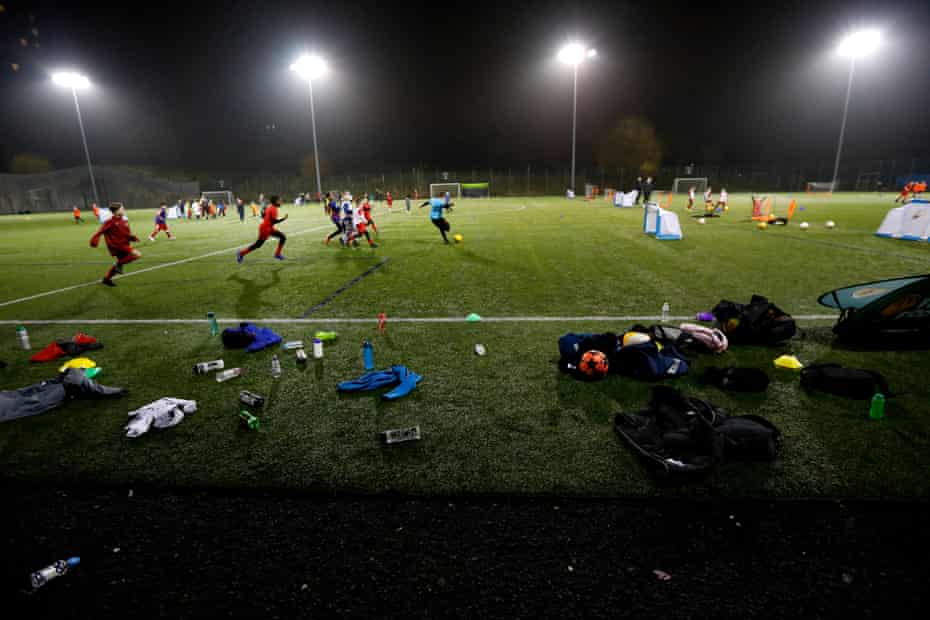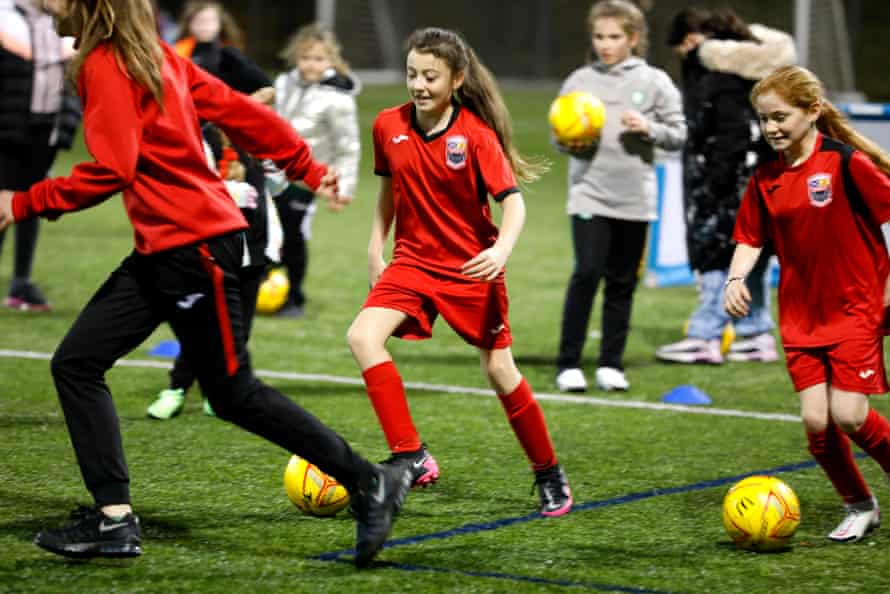[ad_1]
Drumchapel United did not need a pandemic to accentuate their commitment to a greater good. Slowly but surely this club in one of Glasgow’s most deprived areas had been emphasising that the idea of football being intrinsic to a community need not be antiquated.
Drumchapel has needed a positive reference point. Deprivation and life expectancy rates are among the worst in Scotland. The situation looks even more acute when compared with nearby Bearsden and Milngavie, both highly affluent areas.
“It is a place that will always have a stigma,” admits Scott Bland, Drumchapel United’s secretary. “I’m supposed to live five or six years less than people who are just round the corner from me. We live with these things. For the club, it is about putting down a marker where people throughout Scotland know Drumchapel as a really good club. We might have these poverty stats but it’s not about that, it’s about people. We are trying to promote our people.”
Before Covid struck, Drumchapel had been given a Queen’s award in recognition of voluntary work. However, a visit to Holyrood Palace and a civic reception in Glasgow city chambers have had to wait. Bland rather swats off such occasions; nice to attend, but not really the point.
Under the club’s operation sit 31 teams – male and female, from under-nines to over-35s – and 136 volunteer coaches. “I think the community is really excited about what the club is doing,” adds Bland. “There’s a real bond and desire to put across a positive message for Drumchapel.
“There are 9,000-10,000 people in Drumchapel. We have 600-plus players and 136 volunteer coaches. So a strong percentage of the population are involved, playing, coaching, coming to support the teams or being involved in fundraising nights. Everybody in the community knows our club and we are probably the biggest volunteer organisation in Glasgow when you consider those coaching numbers and an executive board of 13 people.”

This, however, has been a year like no other. Bland and his committee members soon realised that essential services they provide had to be tailored as youngsters, many of them vulnerable in different ways, were banned for months on end from playing football.
“The initial challenge came in how quickly it all happened,” says Bland. “I remember taking training on a Monday night and by the Tuesday everything had to stop. We have so many teams, so many coaches and people relying on our role in the community. It might be all some kids have during the week so we suddenly had to think about how we supported them.
“Initially it was very difficult because we hadn’t been through this challenge before and had no idea what it looked like. We had umpteen meetings inside the first two weeks to look at how we dealt with things, but really we thought at that stage it would just be a couple of months and we would be back to normal. We had a plan, which really was all about continuing to support the young people and the community despite the situation we were in.
“The coaches had calls set up once a week for all the teams, even if that just meant some fun challenges; find your favourite player, come back next week and tell us who and why, that is sort of thing. We just tried to keep them engaged on focused on something.”
Exercise programmes were provided to young players. So, too, wellbeing packs and packed lunches as many would rely on even in normal times. Mental health and wellbeing schemes were delivered, as was shopping trips for those in Drumchapel as were forced to shield and could not buy for themselves.
“That’s what the club is about, it isn’t about that big green pitch all the time,” says Bland. “It is hard work but a lot of people relied on that. Our volunteers are from the community so they know what it all means; the don’t mind that extra hour to knock on somebody’s door or put a hygiene pack together. We don’t get round everybody but we try help as many as you can.”
There has also been time to draw breath. The community asset transfer of the Donald Dewar Centre, where teams play, to the club was allowed to continue in the background. Drumchapel have plans for their West of Scotland men’s team to progress through Scottish football’s pyramid; packed footpaths alongside the pitches as friendly games restarted bely any notion this operation isn’t big enough to play in the professional leagues.
The club’s academy teams are now full with parents apparently even more keen than normal to see their children enjoy exercise. More than £3,000 has been needed to fund Covid signage and paperwork but, more pertinently, coaches have needed to be aware of wider fears.
“We saw a lot of girls [more than 100 play at the club] especially when they came back to training who were anxious, they wanted to talk about coronavirus and everything the virus affects, especially with the schools going back,” explains Bland. “‘I’m going into high school, there’s going to be 1,000 people there, how am I going to cope with that?’ The coaches had to be very good at talking through all those issues. We have kids with mental health issues – anxiety, depression – so we had to be there for them.”

Wider appreciation has arrived about the club’s outstanding contribution. “I know I’m not the only person who gets annoyed when Drumchapel is mentioned and the term ‘socially deprived’ has to be attached,” says Bill Kidd, the local member of the Scottish Parliament. “It’s certainly a fact that ‘the Drum’ has genuine issues of poverty still to be overcome and that has to be a priority. At the same time, organisations like Drumchapel United have shown that a place for sport for all age groups is important during these difficult times.”
Soon, Drumchapel United will return to what had become standard elements of their year. Christmas toy drops, community clean-ups and care facility visits by teams were routine long before coronavirus was part of our narrative. As soon as it was, the club stepped forward.
[ad_2]
Source link